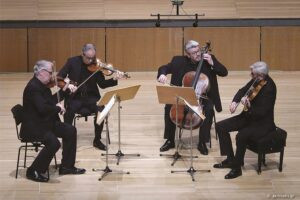“There’s a time for everything,” says Lawrence Dutton, violist of the Emerson Quartet. After 47 years of touring, the renowned string quartet will disband in October. Their performance at the First Congregational Church in Chatham on Friday, part of the Cape Cod Chamber Music Festival, will be the quartet’s last Massachusetts stop on their farewell tour.

In 1976, four Juilliard students formed the original ensemble, naming it after American poet and philosopher Ralph Waldo Emerson. Because Emerson wrote about culture and music, Dutton says, and since 1976 was the U.S. bicentennial, “Emerson sounded like a good American name.”
The founders were Guillermo Figueroa Jr. on viola, Eric Wilson on cello, and violinists Eugene Drucker and Philip Setzer. David Finckel was the quartet’s cellist from 1979 to 2013, followed by Paul Watkins. Dutton became the violist in 1977. Drucker and Setzer have been the violinists for the quartet’s entire life.
“We’ve had such a great run,” Dutton says. The quartet has released over 30 recordings and won nine Grammy awards. They have recorded the complete string quartets of Beethoven, Mendelssohn, Brahms, Bartók, Webern, and Shostakovich, and they have released multi-CD sets of works by Hadyn, Mozart, Schubert, and Dvorák. They were named to the Classical Music Hall of Fame in 2010.
But as the years go by, Dutton says, “it’s getting harder to sustain that level.” Playing difficult music requires mental and physical labor. So does touring. “I don’t really want to keep running around the world,” Dutton says.
The Emerson is the quartet-in-residence at the State University of New York at Stony Brook. There they’ve established the Emerson String Quartet Institute, where the quartet members, together with Finckel, mentor and coach student quartets. Dutton says the Emerson will continue its work at Stony Brook.
He is also looking forward to pursuing solo work. “I like the idea of coming in as a guest with other string quartets,” he says. “Maybe playing viola quintets, or even string sextets.”
But disbanding is still bittersweet. After years of working together, the members of the Emerson have a unique personal and musical bond.
“I know the history of string quartets,” Dutton says. “How people haven’t had good relationships and all that.” Quartets operate with intense closeness, the players giving and receiving criticism as they work toward a musical goal. This closeness can lead to musical success but risks interpersonal failure. For the Emerson, he says, they have always managed to “put the music first.”
“We’re all very different people,” says Dutton. “But we’ve always gotten along. We have respect for each other.” Dutton says the group’s strength is in projecting a unified musical idea.
Chamber music is about camaraderie, he says. “It involves really, really listening and communicating.” One must also be adaptable. “You have to be a great soloist,” he says. “But you also have to be a great inside player and accompanist.” In a string quartet, musical roles are constantly changing. The Emerson was one of the first string quartets in which the violins alternate first and second chairs. This adaptability translates into life on tour, too. “You’re like, oh, our flight is canceled,” Dutton says. “We missed our connection. We couldn’t find any food.” Through it all, he says the Emerson has remained focused on playing good music.
Dutton recalls a statement by Isaac Stern: “’The best way to learn how to play music is to play chamber music.’ I couldn’t agree more with that.”
He reflects on the Emerson’s place in the lineage of string quartets. “We were a part of it,” he says. “We’ve had our mentors, and we’ve mentored many, many quartets. It’s a beautiful tradition, and it will go on.”
At the Aug. 18 concert, the quartet will play George Walker’s Lyric for Strings (1946), Dmitri Shostakovich’s String Quartet No. 12 in D-flat Major, and Ludwig van Beethoven’s String Quartet in E minor, Opus 59 No. 2. The programs change for different concerts on the tour, but Dutton says they’re doing “all of their favorite tunes.”
Walker was the first African American to win a Pulitzer Prize for music. He originally wrote Lyric for Strings as the second movement of his String Quartet No. 1 while he completed his graduate studies at the Curtis Institute. The movement’s original title was Lament. Now, it is performed on its own as an orchestral work as well as for string quartet.
“It’s gorgeous,” Dutton says. The piece, with a devastating melodic line, uses dissonant tension alongside radiant harmony. Though short, it evokes a full range of emotions.
Shostakovich’s String Quartet No. 12 has “an incredible intensity to it,” Dutton says. The quartet is in only two movements instead of the conventional four. The first movement is agitated, alternating between chromaticism and a tonal melody and never quite finding the closure that the ear longs for. The second movement starts with a vigorous, fragmented theme. It’s suspenseful, dramatic, and unpredictable. Its unpredictable nature ultimately resolves in the last chord, which is bright and warm.
The Beethoven is one of the Emerson’s favorites, Dutton says, even though it’s “hard as heck. Hard as blazes.” It has the traditional four-movement structure. Beethoven writes a vibrant first movement (allegro), a sorrowful second (molto adagio), a spirited third (allegretto), and an epic fourth (finale/presto).
The adagio especially stands out for Dutton. “It’s maybe one of the most profoundly beautiful things in all of Beethoven’s writing,” he says. “It’s magical.”
The three pieces share a feeling of finality, Dutton says. Lyric for Strings is a lament. Shostakovich triumphs. As for Beethoven, “the beginning is unsettled,” Dutton says. “but by the end, he’s reached this amazing, satisfactory feeling. He wins in the end, so to speak.”
An Emerson Exit
The event: The Emerson Quartet in concert
The time: Friday, Aug. 18, 5:30 p.m.
The place: Chatham First Congregational Church, 650 Main St.
The cost: Tickets are sold out; call 508-247-9400 for waitlist information
